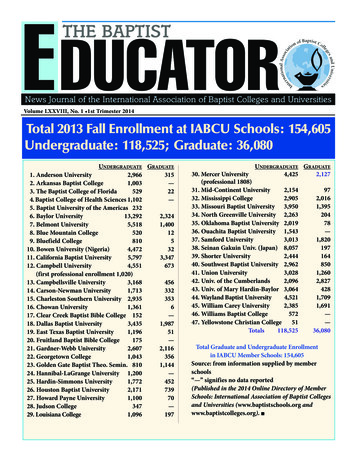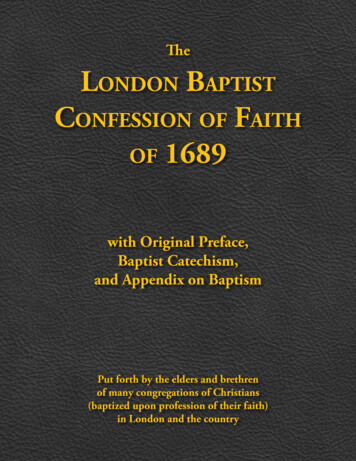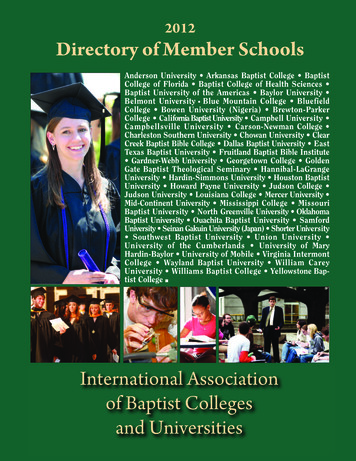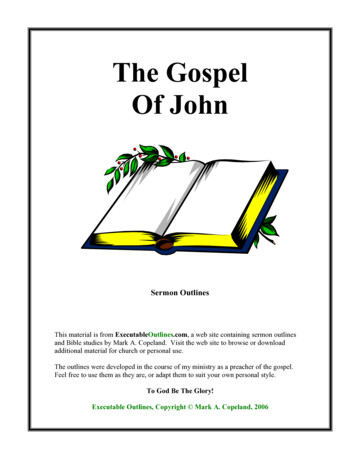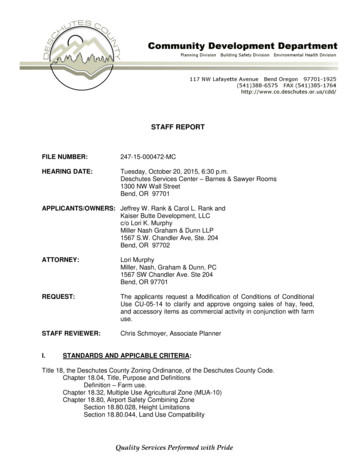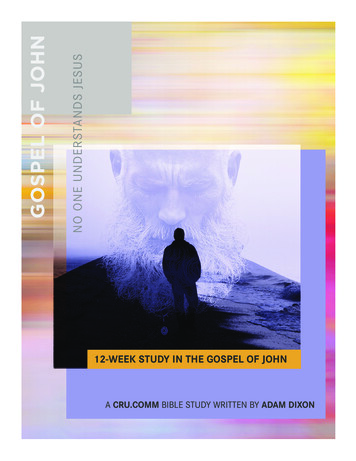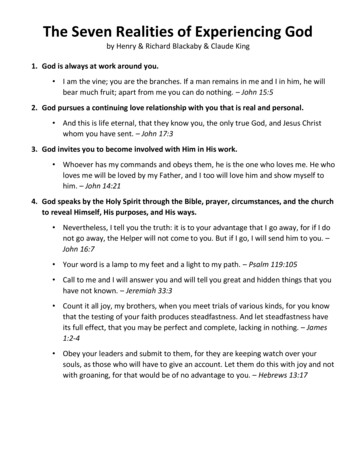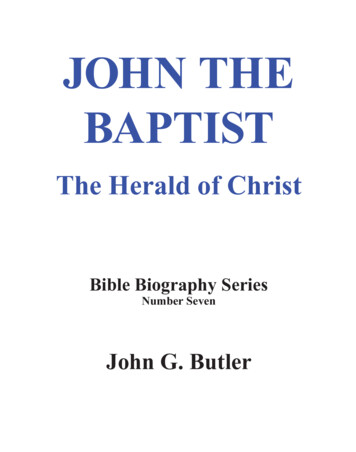
Transcription
JOHN THEBAPTISTThe Herald of ChristBible Biography SeriesNumber SevenJohn G. Butler
ContentsPreface4I. Background4II. Biography11A. THE POLITICAL CONDITIONS 5B. THE PARENTAL CONDITIONS 6C. THE PRIESTLY CONDITIONS8A. THE MOMENT OF THE REVELATION 12B. THE MESSAGE OF THE REVELATION 13C. THE MISTRUST OF THE REVELATION 20III. Birth 24A. THE DELIVERING OF THE CHILD25B. THE DISPUTE ABOUT THE CHILD27C. THE DECLARATION ABOUT THE CHILDD. THE DISCUSSIONS ABOUT THE CHILDE. THE DEVELOPMENT OF THE CHILD 33IV. Beginnings293135A. THE MANDATE ACTIVATING THE MINISTRYB. THE MAN ASSIGNED THE MINISTRY 40C. THE MESSAGE ACCOMPANYING THE MINISTRYD. THE MULTITUDES ATTENDING THE MINISTRYV. Baptizing47A. THE BAPTIZING OF THE CROWDB. THE BAPTIZING OF THE CHRISTVI. Behold 623643464856A. THE WITNESS OF CHRIST63B. THE WORK OF CHRIST 652. His Work and the Judgment of God 67C. THE WORSHIP OF CHRIST71VII. Believers74A. THE LOWLINESS OF HIS FOLLOWERS 74B. THE LEARNING OF HIS FOLLOWERS 78VIII. Belligerents81A. THE INDICTMENT OF THE BELLIGERENTS 82B. THE INTERROGATION BY THE BELLIGERENTSC. THE INDECISION IN THE BELLIGERENTS9184
IX. Bound 94A. THE DETAINING OF JOHNB. THE DOUBTING BY JOHNX. Beheaded1069499A. THE PROVOKER OF THE BEHEADING 106B. THE PARTICULARS OF THE BEHEADINGC. THE POSTLUDE OF THE BEHEADING 118XI. Bouquets120A. THE CONTRASTS IN JOHN120B. THE CONSECRATION OF JOHN 126C. THE CONFIRMATION OF JOHN 129D. THE CONFUSION ABOUT JOHN 131Quotation Sources133JOHN THE BAPTIST Book Outline134113
PrefaceJohn the Baptist as the herald of Jesus Christ was the connecting link between the Oldand New Testaments. Like Samuel of old, John closed out one era and ushered in anotherera. As Samuel concluded the time of the judges in Israel and ushered in the times of thekings, so John the Baptist closed out the law and Moses and ushered in grace and JesusChrist (Luke 16:16).It takes a man of tremendous character to be faithful in a transitional ministry. Sucha ministry is extremely difficult. Popularity will rise and fall in a moment’s notice. Peoplewill not understand nor appreciate this type of ministry well, and the one ministering willhave to really know his calling well for he acts without precedence, without the example ofpast ministries. This book will demonstrate that John the Baptist had the great characternecessary to serve in a transitional ministry. No human, in fact, served better, morefaithfully, and lived more uprightly than John.The outstanding salient features of John the Baptist which this book focuses uponinclude such things as his miracle birth, his disciplined and self-denial living, hischallenging preaching to the multitudes, his practice of baptism from which he got hisname, his great delight in and devotion to Jesus Christ, and his stand against divorce andremarriage—a stand few take today—which cost him his head. John so excelled in hisservice and godly living that when reading in the Scripture of John the Baptist’s greatperformance, we are reminded of a statement in Hebrews concerning the great men of faithwhich says of them, “Of whom the world was not worthy” (Hebrews 11:38). Surely the worldwas not worthy of a ministry like John the Baptist, and it will ever be to their condemnationthat they did not respond better to it.I. BackgroundLuke 1:5–7The appearance of John the Baptist on the world scene was a very significant event. Itsignaled a monumental change in things. “The law and the prophets were until John; sincethat time the kingdom of God is preached” (Luke 16:16). John’s coming heralded a new day.Shadow would become substance; prophecy would become fulfillment; the focus would shiftfrom Sinai to Calvary; the Gospel, salvation, and the church would come front and center;
and the Gentiles would be included in the family of God. All of this was wrapped up inJesus Christ, the One Whom John came into the world to herald.The world into which John came certainly needed his ministry. He came into a hostile,godless world. “Darkness” (Luke 1:79) is the one-word description of the times given byScripture, and it is a most accurate and adequate one-word description. The righteous werefew and far between. The wicked were in power, and wickedness dominated the deeds ofman.To begin our study of John the Baptist, we will examine in more detail the conditions ofthe world into which John was ushered. We will note the political conditions, the parentalconditions, and the priestly conditions. This will give us a look at the nation, home, andreligion that encompassed John at his coming and will thus give us a good picture of justwhat sort of world John entered.A. THE POLITICAL CONDITIONS“In the days of Herod, the king of Judea” (v. 5) succinctly describe the terribly dark politicalsituation in Israel when John was born. Herod (distinguished from the other Herods ofhistory as Herod “the Great”) ruled over all the land of Palestine. Though called the “kingof Judea,” Herod’s rule covered more than the province of Judea. It also took in Galilee,Samaria, and considerable territory east of the Jordan River. Thus as king he ruled over allthe land of Israel. Better we should say, as king he oppressed all the land of Israel.Herod was not a true king of Israel, however. He was not a Jew nor a descendant ofDavid. He was, in fact, an Idumean, an Edomite, which means he was a descendant of Esau.How repugnant this would be to the Jewish mind to have an Edomite, of all things, to siton the throne of the Jewish nation. What a sad state of affairs this indicated for the Jewishpeople. Few things would so disgrace the nation of Israel as to be ruled by an Edomite. Itwas all contrary to the Word of God; it was a reverse of the plan of God. Jacob should rule,not Esau. But Israel had forsaken God, and this was part of their judgment. Great sin bringsgreat judgment. And great judgment it was to have an Edomite ruling them.Since Herod was not of the line of David nor even a Jew, he did not gain his kinglythrone by rightful heritage but had to gain the throne by other means. The means he usedwas to court the favor of Rome, which was the power of the nations then. Through bribery,fast talking, corrupt politics, and constant scheming, Herod was able to maintain favor withRome for many years. The prestigious and coveted title “king of Judea” was bestowed uponhim by the Roman Senate on the recommendation of Anthony and Octavious about thirtyfive years before the birth of John the Baptist. Not all those who ruled for Rome were giventhe title of king. It had to be gained by political maneuvering. As G. Campbell Morganrightly says, “The title was the result of his sycophancy with the Roman empire.” But though
Herod was called a king, he was still a vassal of Rome.Herod was a moral cesspool (he had ten wives), and he was terribly brutal and bloody.He did not hesitate to kill whenever it served his purpose. He killed his competitors. Hekilled his enemies. He killed a number of wealthy Jews and confiscated their wealth forhis own coffers. He even executed a number of the members of his own family. One of hiswives, some sons, and other relatives were executed when he felt they were in the way andthreatened his rule. Through stabbing, forced drowning, strangulation, poisoning, and otherviolent means, he executed people. His most famous brutal act is recorded in Scripture.This act was his ordering the killing of all the children two years and under in Bethlehemafter the wise men had visited the Christ Child (Matthew 2:16–18). With such a history ofbloody behavior, it certainly is no wonder that one of his sons, Herod Antipas, ordered thebeheading of John the Baptist some years later.But as terrible and treacherous as the days were, it was still “in the days of Herod”that God brought John the Baptist—and also Jesus Christ (Matthew 2:1)—into theworld. We must ever remember this fact, for it is a great encouragement to our faith. Goddelights to show His power in the most difficult of situations, and so we should not besurprised when in the darkest of times God does a great work. God is not limited by thecircumstances, by dark times, by great difficulties. We often forget that truth and have ahabit of adopting in our mind a theology which limits God to circumstances. When theHerods are in power, we conclude God is shackled. But how foolish and faithless. Godis greater than any circumstance, any difficulty, any Herod. And He delights to do greatworks when the conditions are the worst so that His power will better be seen and honored.How encouraging this should be to His people. When we are in an “in the days of Herod”situation, we need not give up, cease to expect God’s help, and deny our faith. No, we shouldinstead look for and expect God to demonstrate His power.B. THE PARENTAL CONDITIONSGod always has His remnant even in the darkest of times. Not many were godly at the timeJohn came into the world, as we noted in our introduction; but some were. And what a noblebunch those few godly ones in Israel were: Joseph, Mary, the aged Simeon and Anna, someshepherds, and an elderly priest and his wife—Zacharias and Elisabeth—the future parentsof John the Baptist. We want to especially focus on his parents here. In doing so we will notetwo significant things about John’s future parents: their righteousness and their reproach.1. Their RighteousnessThe character of Zacharias and Elisabeth is given in some detail in Luke’s account. Andwhat we are told by Luke about Zacharias and Elisabeth tells us that John the Baptist wouldhave outstanding godly people for his parents. Like lights piercing the darkness aroundthem, their righteous character shown forth with holy brilliance. “They were both righteous
before God” (v. 6) sums it all up. It is one thing to be judged righteous before man; but whenyou are judged righteous before God, you are indeed righteous! They walked “in all thecommandments [the moral law] and ordinances [ceremonial law] of the Lord, blameless [notsinless perfection, but without legitimate re-proach before man]” (Ibid.).What a great performance, for they walked in “all” not just a few of the commandmentsand ordinances, and they did so in a day when just about everyone else lived wickedly. Thatteaches us a much needed lesson. If Zacharias and Elisabeth could live godly in such times,then so can we in spite of being surrounded by a godless society. We cannot excuse ourlaxity in holiness on the fact that most people are living unholy lives. The character failuresof others does not force or excuse our failures. We do not have to go along with the crowd.Zacharias and Elisabeth prove that fact well.Of course, not going along with the world will cost. You do not march to a differentcadence than the world does without the world getting upset. They will do all they can toget you to conform to their beat (and by the sound of things, much music in our churchescertainly has conformed to the beat of the world); and if you do not conform, they can getpretty nasty. But that still does not mean you cannot walk uprightly, nor does it excuse youfrom walking uprightly.2. Their ReproachZacharias and Elisabeth carried a very heavy burden of re-proach nearly all their marriedlife. We learn some important truths about trials here in the character of this trial, thecouple in this trial, and the conduct during this trial.The character of this trial. The reproach was caused by the fact that “they had no child,because that Elisabeth was barren” (v. 7). Furthermore, all hope was gone that they wouldever have a child; for “they both were now well stricken in years” (Ibid.). The sting ofbarrenness will not be appreciated in our age of bloody, heartless abortion. But in thosedays it was a terrible thing for a Jewish woman to be barren. It took away any hope of thepromised Messiah coming from her, and it “was not infrequently looked on as a mark of theDivine displeasure, possibly as the punishment of some grave sin” (H. D. M. Spence). Thehopes of Zacharias and Elisabeth would be high and joyous when they were first married.But as time went by, their hopes would diminish and the trial would become heavier as theirreproach among men would be ever increasing. The reproach was so prominent in their livesat the time Elisabeth conceived, that the first thing Scripture reports her saying after sheconceived was, “The Lord . . . looked on me, to take away my reproach among men” (Luke1:25).The couple in this trial. The trial of John the Baptist’s parents reminds us that righteousnessdoes not exempt one from painful trial. Though “righteous before God, walking in allthe commandments and ordinances of the Lord, blameless,” still God permitted bitter,burdensome trial to dog their lives for years. Righteousness prevents many trials—those
trials which are a result of sin—but it does not prevent them all as “Many are the afflictionsof the righteous” (Psalm 34:19) attests. Thus to have troubles and trials does not indicateone is a lesser saint. It may mean, in fact, that one is a superior saint; for the best saintsare subject to the most attacks by Satan because they are the most trouble to him of allthe saints. Furthermore, the best saints will be polished the most by the Lord just as alapidary puts the best stones to the grindstone the most to bring out their beauty. Hence, therighteous will indeed know trial in their life.The conduct in this trial. The reaction of Zacharias and Elisabeth to their trial was veryexemplary. The trial only served to reveal more fully their godly character. Though burdenedwith heavy trial, the devotion of Zacharias and Elisabeth to the Lord and His service didnot decline. They did not castigate God, forsake Him, complain, and murmur as so manylesser souls do in such times. Rather, they continued to be faithful in all things, trustingGod’s wisdom as to the reason for their trial. It was a noble response to the trial, and it is theonly way to face trial. As Maclaren said in commenting on their trial of unfulfilled hopes,“Let us learn that unfilled wishes are not to clog our devotion, nor silence our prayers, norslacken our running the race set before us.”The world, of course, responds much differently to trial than did Zacharias andElisabeth. “Curse God, and die” (Job 2:9) is a favorite response to trial by the world. But noone will face trial victoriously by blaspheming and blaming God and then throwing in thetowel and quitting.C. THE PRIESTLY CONDITIONSThe religious life of Israel rose or fell on the condition of the priesthood. By examining thecondition of the priests in Israel at the time of John’s coming into the world, we will learnmuch about the condition of religion in Israel at that time. In examining the condition of thepriests, we will learn about the corruption of the priests, the conspicuousness of the priests,and the consecrated among the priests.1. The Corruption of the PriestsWhen John the Baptist came into the world, the religious life of Israel was corruptedbecause the priesthood was greatly corrupted. One big reason the priesthood was socorrupted was that it was considerably influenced and controlled by Herod. This was donein two significant ways. First, he chose the High Priest; and second, he constructed a veryimpressive Temple in Jerusalem for the Jews.Choosing the High Priest. The High Priest was the virtual head of the religious system inIsrael. He was over all the priests and had great authority and influence. A good High Priestwould improve the character of the land; a bad High Priest would do just the opposite. Theimportant High Priest post was, according to God’s law, to be a lifetime position and one
dictated by one’s relationship to Aaron, the first High Priest of Israel. But when John cameinto the world, the High Priest position was a political appointment. It was being dictated byHerod. Thus the High Priest would curry favor with the wicked Herod, overlook his evils,and encourage and influence the other priests to do likewise—all of which would corrupt thepriesthood in a great way. The greatness of the corruption of the priesthood culminated inthe priests’ terrible opposition to Jesus Christ which was seen so vividly in their leading thepeople to call for His crucifixion.Constructing the Temple. Herod’s firm and corrupting hand on the priesthood and thereligious life of the people was strengthened considerably by his building a new Temple inJerusalem. The Temple was, of course, the hub of the religious life of Israel as it was intendedto be from the time of Solomon’s Temple. Thus in building the Temple, Herod wouldingratiate himself to the Jewish people. They would feel indebted and obligated to himwhich in turn would give him undo influence over their religious life. Having this control oftheir religious life meant he had even more control over the people politically—which wasHerod’s main goal.Started in 20 b.c., this Temple was a huge and magnificent project that was notcompleted until some years after Herod died and his sons were ruling the land. The length oftime it took to build the Temple is seen in the statement made by some Jews during Christ’sministry, “Forty and six years was this temple in building” (John 2:20). Herod was quite thebuilder of buildings. And typical of government, it was done through burdensome taxationof the populace. He built a royal palace, many fortresses, temples for Gentile idolatry, andother edifices. But the building of the Temple in Jerusalem was considered by many tobe the greatest of Herod’s achievements. Rabbinical literature emphasizes the beauty ofthe structure by stating that you had not seen a beautiful building until you had seen thisTemple. But the beauty of the Temple did not include the beauty of holiness. The Templewas simply a corrupt political ploy of Herod, so he could dominate the people all that muchmore. In fact, he so dominated things, he was able to put the Roman eagle on the mainentrance of the Temple.2. The Conspicuousness of the PriestsIt is believed that there were as many as twenty thousand priests at the time John cameinto the world. Such a large number of priests meant the priests would be very conspicuous.This conspicuousness helped them to be very prominent and influential in the land. Theykept their Temple service (based after the service originating with the Tabernacle) withgreat care. So much so that we read that Zacharias was “of the course of Abia [Abijah, 1Chronicles 24:10]” (v. 5). During David’s time, the priests were divided into twenty-fourgroups to better organize their administration. The groups were named after the sons ofEleazar and Ithamar who were the sons of Aaron. Abijah was the eighth course of thetwenty-four. During the captivity, most of these courses lost their identity. “Only four of
these courses (Jedaiah, Immer, Pashu, Harim) returned from Babylon, but these four weredivided into twenty-four with the old names” (A. T. Robertson). When John came into theworld, the priests were following the twenty-four course set-up to the letter. This would goalong with their being so particular about following tradition, but it would also make theadministration of the priests more efficient since there were so many priests.Because of the prominence of the priesthood, “The great national feasts of the Passover,of Tabernacles, and of Pentecost, were celebrated with solemn pomp, and attracted vastcrowds from all the world. In every part of the land synagogues were maintained withpunctilious care, and crowds of scribes were perpetually engaged in a microscopic studyof the law, and in the instruction of the people. In revenue, and popular attention, andapparent devoutness, that period had not been excelled in the most palmy days of Solomonor Hezekiah” (F. B. Meyer).But it was all superficial. Few worshippers were genuine. As F. B. Meyer adds, “Beneaththis decorous surface the rankest, foulest, most desperate corruption throve.” We have muchreligion today that is no different. From popular religious TV programs to homosexualchurches to the immoral behavior of some so called “fundamentalist” leaders, we see muchduplication in our day of the corrupt religious situation that existed in Israel at the time ofthe coming of John the Baptist into the world.3. The Consecrated Among the PriestsThough “the general character of the priesthood was deeply tainted by the corruptionof the times, and as a class they were blind leaders of the blind” (F. B. Meyer), there werestill some who were true and genuine in their piety—Zacharias for one. He was indeed atrue priest in both heart and heritage. With the godly character he had, which we notedearlier, Zacharias would not go through the motions in mere outward show in his serviceas most priests in his day did; but he had his heart and soul in his service. His heritagewas superb, too. He was of the line of priests. Not only was he a descendant of Aaron, andthus rightfully a priest; but his wife was also “of the daughters of Aaron” (v. 5). In fact,her name, Elisabeth, was the same name as Aaron’s wife (Exodus 6:23, “Elisheba” is theO.T. form of the N.T. “Elisabeth”). “To be a priest and married to a priest’s daughter was adouble distinction” (Plummer). A. T. Robertson adds that it was “Like a preacher marriedto a preacher’s daughter.” Would that all priests had been like Zacharias. In fact, would thatall ministers even in our day were of the caliber of Zacharias—righteous, a good marriage,morally impeccable, genuine, and devoted to God’s Word.With both of John’s parents being descended from Aaron, John would be very muchentitled to the priesthood. He could claim priestly succession if anyone could. And normallyit would have been logical and expected for him to enter the priesthood. But, of course, Johndid not go into the priesthood. It would have been incongruent with his calling. Instead ofthe priesthood, John was Divinely commissioned to herald in “that very kingdom of gracethat destined to unconsecrate and abolish the old order of things” (Grosart), which we noted
in the introduction of this chapter. He would point to the One Great High Priest Whowould make it unnecessary to continue the priestly arrangement so honored in the Temple,and Who would establish a pure priesthood composed of born-again believers.Being born into a priestly family—today we would say he was raised in a preacher’shome—would make John well acquainted with the religious conditions in the land and thecorruption it represented His scathing denunciation of the religious leaders during his publicministry would come from personal, first-hand information of their degradation. He knewfrom his father’s reports and from his own observation what a farce religion was in his day.Therefore, when he began his public ministry, he would say to the religious leaders, “The axeis laid unto the root of the trees; therefore, every tree which bringeth not forth good fruit ishewn down, and cast into the fire . . . he [Christ] will thoroughly purge his floor, and gatherhis wheat into the garner [granary]; but he will burn up the chaff with unquenchable fire”(Matthew 3:10,12).II. BiographyLuke 1:8–22Before the birth of John the Baptist, in fact, even before the conception of John by hismother Elisabeth, an angel gave a short but very informative biography of John. The angelwas Gabriel. This was the angel who appeared to Daniel regarding his visions of the future(Daniel 8:16, 9:21), and it was the angel who would also appear to Mary to announce to herthat she was to be the mother of our Lord (Luke 1:26–38). To Daniel and Mary you canadd the name Zacharias. For it was to Zacharias the priest and the future father of John theBaptist that Gabriel appeared and gave the Divine revelation which was a biography-inadvance of John the Baptist. Zacharias had a rare experience, a choice experience, one hewould never forget, and one which we are indebted to Luke for reporting in detail.If it were not for the Gospel of Luke, much inspiring and instructive informationregarding John the Baptist would not be in our possession. All four Gospels speak of Johnthe Baptist. But of the four, only Luke speaks of the events and situations surroundingthe coming of John into the world. The other three Gospels begin the story of John theBaptist with the commencement of his public ministry. But Luke begins the story with theannouncement by an angel about John’s coming into the world. Luke’s account of John’scoming into the world, which will take up this and the next few chapters, is invaluable inproviding a proper understanding and appreciation of the ministry of John the Baptist aswell as providing much instruction for our faith and conduct.In studying this record of Gabriel’s appearance and the revelation he gave to Zachariasof John the Baptist, we will note the moment (vv. 10–12), the message (vv. 13–17), and the
mistrust (vv. 18–22) of the revelation.A. THE MOMENT OF THE REVELATIONThe moment when the angel Gabriel appeared to Zacharias was a special time, a prayingtime, and a fearful time.1. A Special TimeThe day Gabriel appeared to Zacharias was a very special day for Zacharias. But itbecame so very much more special than he had ever anticipated. His initial view of the daybeing special would be in the fact that “his lot was to burn incense when he went into thetemple [the Holy Place as distinguished from the entire building—two different Greekwords are translated ‘temple’ in the New Testament; one refers to the Holy Place, the otherto the entire building] of the Lord” (v. 9). “The office of burning incense . . . was the mostcoveted of all the priestly duties. The Talmud says the priest who obtained the right toperform this high duty was not permitted to draw the lot a second time in the same week,and as the whole number of the priests at that time was very large—some say even as manyas twenty thousand—Farrar conjectures that it would never happen to the same priest twicein his lifetime to enter that sacred spot” (Spence). Because Zacharias was up in years, thisonce-in-a-lifetime honor would be all that much more special to him.But while he was offering the incense, something very unexpected happened which madethe offering of incense an honor which paled in comparison to this unexpected experience.The angel Gabriel “appeared unto him . . . standing on the right side of the altar of incense”(v. 11) and told him some of the best news he had heard in his entire life. He told him aboutJohn the Baptist—about his coming, his life, and his ministry. This revelation of John madethe time far more special than Zacharias could have ever imagined.2. A Praying TimeWhen the angel Gabriel appeared to Zacharias, “the whole multitude of the people[who were gathered at the Temple] were praying without [in an outer court of the Temple]at the time” (v. 10). When the priest went into the Holy Place to burn incense on the altarof incense, it was the practice of the people at the Temple to be in prayer at that time. Theywould gather in the outer courts and kneel in supplication to God. The altar of incense isoften associated with prayer. The aroma from the incense rising up in the air after being puton the hot coals on the altar, spoke of prayer ascending to God. “Let my prayer be set forthbefore thee as incense” (Psalm 141:2). Therefore, when the priests burned incense on thealtar, it was very appropriate that the people should be gathered in prayer.Adding to the emphasis on prayer at the time of the Divine revelation was the fact thatthe angel Gabriel mentioned prayer in his speaking with Zacharias. Right at the outset of hismessage, the angel said to Zacharias, “Thy prayer is heard” (v. 13). So this time of revelationfrom heaven about John the Baptist was indeed a time of prayer. Everyone at the scene was
involved with prayer.God honors prayer, and so it is not surprising that He chose the time of prayer togive the heavenly message to Zacharias and eventually to the people. Prayer does indeedilluminate the hearts and souls of men. Praying men and women will hear more from Godthan the non-praying crowd. Spend much time in true prayer, and you will not walk inspiritual ignorance.3. A Fearful TimeThough the visit of the angel was a very special blessing, it did not seem like a blessingat first. For “when Zacharias saw him, he was troubled, and fear fell upon him” (v. 12). AnIsraelite had a morbid fear of seeing the supernatural. He thought it was a harbinger ofdeath. Gideon (Judges 6:22,23) and Samson’s father Manoah (Judges 13:22) illustrate thisattitude. Not only did the Israelites fear the seeing of the supernatural, but the godly alsofears such a meeting; for it “reminds us forcibly of our own imperfection, and of our naturalunfitness to stand before God” (Bishop Ryle). Later in the Gospel of Luke, we can read ofMary and the shepherds showing this fear at the seeing of the supernatural. While theremay be fault in some of these people’s fear, their fear of God is a healthy thing. Such a fearpromotes holiness. Irreverence is a far different story. No soul will go wrong by tremblingin the presence of a heavenly visitor. There is so much irreverence in regards to God todaythat it would be a welcome relief to see some fear of the supernatural even if the fear was notalways without fault.Because the visit was not judgmental but was to inform of blessing, the angel putZacharias’ fears to rest with his “Fear not” (v. 13). The same thing will be said to Mary(Luke 1:30) and to the shepherds (Luke 2:10). Likewise the same message was spoken toGideon (Judges 6:23), and Manoah’s wife rightly reasoned with Manoah that he shouldnot fear either (Judges 13:23). Those who are right with God will have their fears removed.But those who are in rebellion against God will not experience the removal of fear. Whenjudgment brings fear, it is not fear that is removed. It is fear that remains and that alsoincreases. “It is a fearful thing to fa
John the Baptist as the herald of Jesus Christ was the connecting link between the Old and New Testaments. Like Samuel of old, John closed out one era and ushered in another era. As Samuel concluded the time of the judges in Israel and ushered in the times of the kings, so John the Baptist cl
